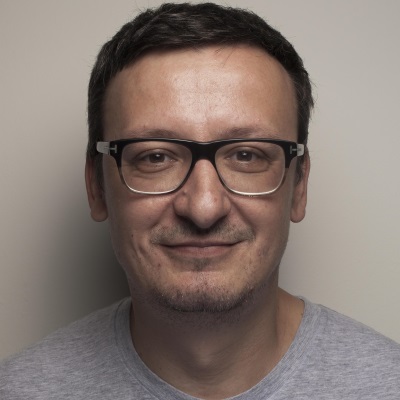
Viktor Farcic: I tend to break things a lot and learn from the outcomes
A new fresh day, another amazing speaker. Today we bring you the interview with Viktor Farcic, senior consultant at CloudBees and author of several important materials on DevOps.
You can get to know Viktor a little better by reading his blog and, of course, by reading this interview with him!
DevExperience: What did you want to become when you were a child?
From the moment I got my first computer, I wanted to become a hacker. At that time, I was seven or eight years old, and I did not know that "hacker" existed as a word. However, I developed a taste for learning what programs do by going into the source code, changing random things, and observing results. At that time I did not know how to program. Reverse engineering was my method of learning.
Even though I gave up on the idea of becoming a hacker, I still maintain the same way of learning. I tend to break things a lot and learn from the outcomes.
DevExperience: What is the story of your begining in this field? How did you start working in this industry?
At very early age, I got my first computer Amstrad 64. The problem was that it had no games and no software apart from OS. The only thing that came with the computer was a book written in German (which I did not speak at the time). After a few failed attempts to find a place where I could buy some games, I decided to write code from that book into a terminal. Since I did not speak the language (German), I could not know what the code does nor what is its purpose. So, I had to spend hours writing things I did not understand and observe the result. Then I'd change something at random, and observe a different result. I learned programming by doing random things out of boredom and inability to get anything more meaningful out of my computer.
DevExperience: How do you see the IT industry 10 years from now?
I think that 10 years from now many of us will become obsolete and unneeded. Providers like AWS, Azure, and GCE will continue adding new services. Those services will replace more and more of our work. That does not mean that we will not need skilled engineers. Quite the contrary. However, those of us involved in doing mundane, non-creative, and repetitive tasks will probably lose jobs. Learn how to be good at what you do and do something new every day if you want to keep your job. If your job is to do the same today as what you did yesterday, your value in the market will shrink with time.
DevExperience: What have you learned about IT people from different cultures while traveling the world with your work?
I think that most people are facing the same problems all around the world. However, many are hiding behind those problems by saying that they are somehow different. I keep hearing things like "this is great, I'd love to use it, but it does not apply in our case because of this and that." I think that those assumptions are a result of a subconscious self-defense mechanism. In reality, almost everyone needs the same things. We all need scalable, fault tolerant, and highly available systems. We all need to ship features as fast as possible without sacrificing quality. We all want to provide more value to our users. When I hear "we are different", I tend to translate that to "we are so far behind, that we cannot do that". That is a valid concern that is probably true for most of the industry. But, it can be solved, and the first step is to acknowledge that we all have, more or less, the same high-level goals.
DevExperience: How do you see Iași and Romania regarding IT industry? Also, what did you know about them before first coming here?
To be honest, I was a bit skeptical about coming to Iasi the first time. I knew nothing about it, and I expected it to be uninteresting and unappealing. I changed that opinion very fast. Now I love Iasi. It's a charming town with great people and fantastic energy. This is my third year in Iasi, and I plan to keep coming back.
DevExperience: What is your advice for a junior who wants to develop a career in IT?
Open source, open source, open source.
The industry is changing, and you want to build your curriculum in a way that is publicly visible. When you do some work for a company, that work is not visible to anyone. The only thing you have is a sentence in your CV saying where you worked and in which role. When you contribute to open source, your work is exposed to everyone. There is no doubt what you can or cannot do. We can already observe, especially around San Francisco area, that, when looking for job candidates, companies tend to put primary focus to the public code available in GitHub.
DevExperience: What do you do for your both personal and professional development? How does a normal day looks like for you? What about a not so normal day?
I'm not sure I can distinguish normal from not so normal days. I tend to do a lot of different things. I spend part of my time consulting other companies. Most of those companies are big enterprises. When not consulting, I spend a lot of time on conferences giving talks and workshops. Those activities are a great opportunity to connect not only with bigger companies but also with all other shades of the industry.
Apart from the desire to share knowledge, conferences and consulting work gives me a very valuable insight into the state of the industry as a whole and allows me to focus on systems-level thinking. I spend most of the rest of my time contributing to various projects, blogging, writing books, and helping a few communities. If someone would ask me to describe my "real" role (not what is my official title), I would not know what to say. It's a mixture of consulting, coding, evangelizing. You might say that I'm a developer that works as a consultant and a developers advocate who just happens to write books and blog posts in his spare time.
DevExperience: What is the greatest part of your job? What is the not so great part of it?
The greatest part of my job is freedom. CloudBees gives me a lot of space to explore. They put a lot of trust in me by letting me do what I think makes sense at any given moment. There are not many companies like that.
DevExperience: How would you explain to an old lady who knows nothing about technology what is it exactly that you do? :)
I help others become better at what they do.
DevExperience: Tell us more about the main ideas of your talk and your workshop at DevExperience! Why should people register and attend the event?
I don't want to spoil the talk and the workshop so I won't reveal the details. The talk tries to dismantle some of the misconceptions and wrong assumptions people have about continuous delivery and deployment. I'll try to prove that no one in the audience is practicing it. I'll argue that everyone is faking the success. The workshop, on the other hand, will be very intense. I'll try to teach attendees the philosophy behind a self-sufficient system. I'll try to show them how we can automate ourselves so that we become unneeded and can go to vacations without worry what'll happen while we're away.
Viktor will have an amazing talk during the DevOps track and also he will bring you an advanced workshop a day before the big conference. So you`d better register and take a ride with us in April!
